Share
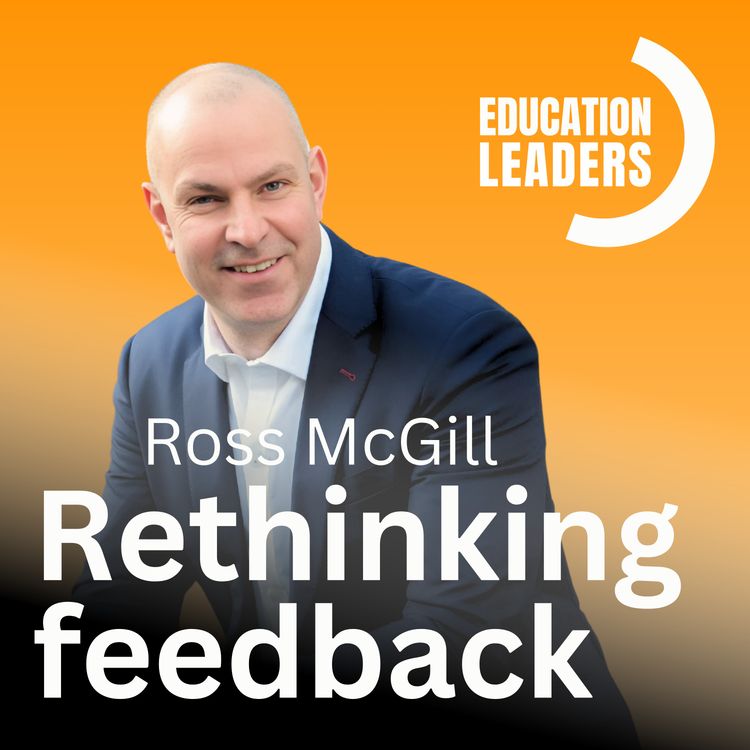
Education Leaders | Strategic School Leadership
Rethinking feedback | A conversation with Ross McGill
Shane welcomes globally renowned educator Ross McGill, known worldwide as Teacher Toolkit. Ross shares his groundbreaking approach to feedback and assessment, challenging traditional marking practices and offering practical alternatives that can transform how schools approach feedback while reducing teacher workload.
Ross introduces a comprehensive framework of nine different feedback approaches (feedback, feed up, feed forward × written, verbal, nonverbal) that enriches assessment practices beyond simply marking books. He shows that what matters most is whether students trust the feedback they receive and know how to act on it, not just what form the feedback takes.
You can find the full video of this conversation inside the Education Leaders Community.
- Teacher Toolkit website
- The Teacher Toolkit Guide to Feedback (Ross's latest book)
- Verbal Feedback Research Project (UCL research mentioned)
Episode Partners
The International Curriculum Association's Global.Learn.Connect Netherlands: Learn more
The University of Warwick's International Programmes | Learn more at warwick.ac.uk
Thank you for tuning in, and as always, if you found this episode useful, please share your experience. You can find me online on LinkedIn and Bluesky. My website is shaneleaning.com and email address is shane@shaneleaning.com.
About the host
Shane Leaning, an organisational coach based in Shanghai, supports international schools globally. He co-founded Work Collaborative and hosts the chat-topping school leadership podcast, Education Leaders. Previously, he worked as Regional Head of Teaching Development for Nord Anglia Education. Passionate about empowering educators, he is currently co-authoring 'Change Starts Here.' As a CollectivEd Fellow, Teacher Development Trust Associate, and TEDx speaker, Shane has extensive experience in the UK and Asia and is a recognised voice in international education leadership. Learn more at shaneleaning.com.
Join Shane's Intensive Leadership Programme at educationleaders.co/intensive
Shane Leaning, an organisational coach based in Shanghai, supports school leaders globally. Passionate about empowment, he is the author of the best-selling 'Change Starts Here.' Shane is a leading educational voice in the UK, Asia and around the world.
You can find Shane on LinkedIn and Bluesky. or shaneleaning.com
More episodes
View all episodes
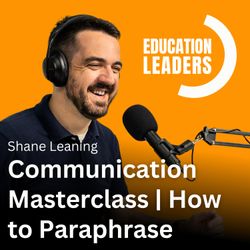
149. Communication Masterclass | How to Paraphrase
16:48||Ep. 149You explained it clearly, they nodded, and two weeks later three people did three completely different things. This episode tackles one of the most common and costly communication breakdowns in school leadership: assuming that because you said it, it landed. Shane draws on research from Cornell and Stanford, including the "tappers and listeners" study, to explain why even experienced leaders consistently overestimate how clearly their message has been received, and why just knowing about these biases isn't enough to fix them. The answer is a simple three-step habit called paraphrasing: signal, restate, check. You'll learn why paraphrasing is fundamentally different from just repeating words back, how it surfaces misunderstandings in the moment rather than weeks later, and why it's especially valuable in international school settings where language and cultural norms add another layer of complexity. Shane also covers how to handle the slightly awkward moment when someone looks at you like you're going oddly slowly, and why naming what you're doing dissolves that resistance almost immediately. If you're ready to try one thing this week that will change how your conversations feel, press play. Resources & Links Mentioned:Shane Leaning's Education Leaders IntensiveEpisode PartnersInternational Leaders ConferenceTeaching Walkthrus
148. Parent-Driven School Storytelling | A Conversation with Selina Boyd
29:42||Ep. 148Selina Boyd, international editor of The Good Schools Guide, reveals what actually matters when parents choose schools for their children. With over a decade reviewing international schools and more than 1,600 schools assessed worldwide, Selina explains why authentic leadership isn't about what leaders say about themselves, but what parents and students say about them. This conversation challenges school leaders to rethink how they communicate their school's story in an era where parents are savvy researchers who trust other parents more than polished marketing materials. You'll learn the specific moments that signal whether students are genuinely thriving, from children running up to show their work to sixth formers who can articulate why they chose your school. Selina shares practical examples of authentic school storytelling, including how one international school used Instagram reels to connect with future students in a way that felt genuine rather than contrived. If you're trying to build trust with prospective families whilst navigating social media and modern parent expectations, this conversation offers a refreshing perspective on letting others tell your school's story. Resources & Links Mentioned:The Good Schools GuideSelina Boyd on LinkedInEpisode PartnersInternational Leaders ConferenceTeaching Walkthrus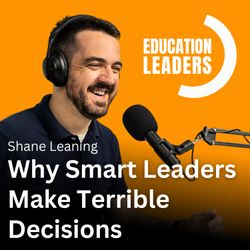
147. Why Smart Leaders Make Terrible Decisions
18:03||Ep. 147You hired the wrong person, killed a working programme, or ignored a massive risk whilst feeling completely rational the whole time. This episode unpacks five cognitive biases that sabotage school leadership decisions constantly: anchoring, availability bias, endowment effect, groupthink, and optimism bias. Shane shares real examples from his own leadership mistakes, including a disastrous hiring decision driven by a compelling opening story, and explains why these mental shortcuts that usually help us actually wreck leadership decisions. You'll learn practical systems to catch yourself before these biases derail your next major decision. Shane walks through how to counter anchoring with "consider the opposite" thinking, why you need a decision journal to spot availability bias patterns, how to set up kill committees for initiatives you've personally championed, and why assigning a devil's advocate role fights groupthink. If you've ever wondered why smart leaders sometimes make terrible collective decisions, or why your optimistic timelines never match reality, this episode gives you the frameworks to make better choices and build trust with your team. Resources & Links Mentioned:Change Starts Here by Shane LeaningEpisode PartnersInternational Curriculum AssociationTeaching Walkthrus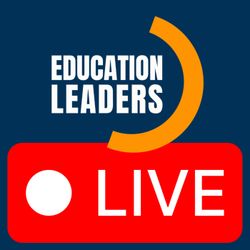
145. LIVE | January Reflections
45:48||Ep. 145Chris Scorer and Shane Leaning got together to unpack some of the big themes from recent episodes, particularly that vulnerable solo episode Shane put out about self-doubt and imposter syndrome. The response to that one has been overwhelming, especially the private messages from leaders who haven't felt able to share their struggles publicly. Chris and Shane dug into why we've become so intolerant of failure in education, how accountability has overtaken development in our systems, and whether that's creating environments where leaders feel they have to hide their vulnerability rather than use it as a learning opportunity.We also talked about Jet Wolper's brilliant episode on questioning the status quo and why we keep cutting the ends off ham. It challenged our developmental approach to change because sometimes, as Chris pointed out, you need to strip things back before you can build them up properly. Chris shared James Miller's gutsy move at Royal Grammar School Newcastle, where he simply got rid of anything that wasn't actually helping kids. We wrapped up talking about curiosity as an antidote to the winter blues and how being one step more curious this February might be exactly what we need.Episodes mentioned:Tam Proctor on school character and culture: shaneleaning.com/podcast/140James Mannion on making change stick: shaneleaning.com/podcast/142Jet Wolper on the tab tax and cutting the ends off ham: shaneleaning.com/podcast/144Self-doubt and imposter syndrome (solo episode): shaneleaning.com/podcast/145Join us live: educationleaders.live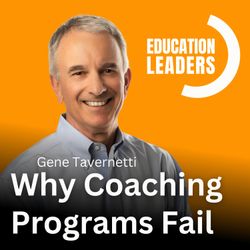
146. Why Coaching Programs Fail | A Conversation with Gene Tavernetti
27:57||Ep. 146Instructional coaching should be a powerful engine for teacher development, yet so many school initiatives stall or backfire. Why? In this frank conversation, Dr. Gene Tavernetti joins Shane to dissect exactly where and how coaching programmes commonly fail. With over thirty years in education (as coach, teacher, counselor, administrator, and consultant), Gene pulls no punches on the systemic pitfalls, from treating coaching as a remedial tool to the crippling myth of total confidentiality. As author of Teach FAST and Maximizing the Impact of Coaching Cycles (John Catt Education) and co-founder of Total Educational Systems Support (TESS), Gene has spent nearly two decades training teachers and those who support them in providing the best instruction possible. You'll learn why a mandatory, school-wide approach is often better than a voluntary one and how to strategically select your first teachers to coach to build credibility. Gene explains the critical difference between professional and personal relationships in coaching and why a shared, evidence-based focus is non-negotiable. Guided by his core belief that given the right environment and proper support, everyone can improve and succeed, Gene shares the practical, scar-tissue wisdom you need to avoid common mistakes and build a sustainable culture of improvement. Resources & Links Mentioned:Gene Tavernetti on LinkedInJim Knight’s Instructional Coaching GroupDoug Lemov’s Teach Like a ChampionStephen Covey’s The 7 Habits of Highly Effective PeopleJohn Kotter’s 8-Step Change ModelEpisode PartnersInternational Curriculum AssociationTeaching Walkthrus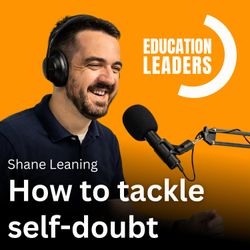
145. How to Tackle Self-Doubt
13:27||Ep. 145You know that feeling when you wake up with a weight on your chest, convinced you don't belong and everyone's about to find out? Shane gets vulnerable about a recent morning just like that: when a piece of work that wasn't his absolute best sent him spiralling into shame. This solo episode tackles the difference between "I did something imperfect" and "I am not good enough," and why that distinction matters so much for school leaders who hold themselves to impossibly high standards. You'll learn the crucial difference between shame and guilt (and why one protects you whilst the other keeps you stuck), how to separate the stories you're making up from actual data, and why your character matters more than your competence in any single moment. Shane shares frameworks from Brené Brown, Adam Grant, and Stephen Covey, but also gets honest about why sometimes you can't think your way out, sometimes you just need to feel it. If you've ever felt like an imposter or struggled after work that wasn't perfect, this episode will remind you that you're not alone. Resources & Links Mentioned:Adam Grant's "Think Again"Stephen Covey's "The Speed of Trust"Episode PartnersInternational Curriculum AssociationTeaching Walkthrus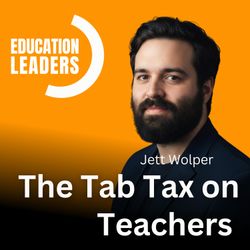
144. The Tab Tax on Teachers | A Conversation with Jett Wolper
28:57||Ep. 144Why do schools continue using systems they hate? Jett Wolper from Sisi challenges the assumption that broken school systems are inevitable. Most educational technology wasn't designed for teachers, it was built for the people who purchase it, creating a 20-year legacy of platforms that work on paper but fail in practice. From timetabling that consumes enormous amounts of leadership time to communication scattered across WhatsApp, email, and multiple other platforms, these inefficiencies aren't just frustrating, they're directly contributing to teacher burnout and even affecting school admissions and finances. You'll learn why a story about ham perfectly explains most school systems, how duplicate data entry steals time from students, and why the best technology should be invisible. Jett shares practical steps for identifying which systems are draining your time, explains why centralising communication can transform a school overnight, and reveals Sisi’s vision for eliminating administrative tasks entirely. If you're exhausted by platforms that require three-month training courses or tired of juggling dozens of browser tabs just to get through your day, this conversation offers a genuinely different approach to how schools can operate. Resources & Links Mentioned:Sisi School Management PlatformSisi on LinkedIn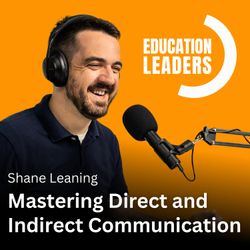
143. Mastering Direct and Indirect Communication
14:08||Ep. 143What if being direct isn't the same as being clear? Shane challenges a core assumption in leadership advice: that directness equals clarity. Drawing on Edward Hall's work on high and low context cultures and a recent conversation with Eunice Okpotu about psychological safety, Shane introduces a quadrant framework that separates directness from clarity. He's seen UK heads who are incredibly direct yet leave staff confused, and Chinese leaders who never directly confront anyone yet maintain crystal-clear standards across their schools. You'll learn the four quadrants of communication (direct and clear, direct and unclear, indirect and unclear, and indirect and clear), when to use each approach, and why indirect clarity is an overlooked leadership tool. Shane explains why indirect communication can preserve face whilst maintaining standards, when directness is essential (performance issues, safety concerns, legal requirements), and how the most effective leaders are fluent in both modes. If you've ever been frustrated by indirect communication or wondered why your direct feedback isn't landing, this framework will change how you think about leadership communication. Resources & Links Mentioned:Edward Hall's work on high and low context cultures Episode PartnersInternational Curriculum AssociationTeaching Walkthrus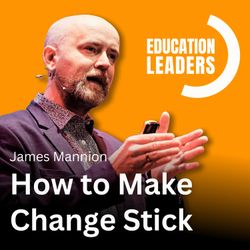
142. How to Make Change Stick | A Conversation with Dr James Mannion
33:12||Ep. 142Dr James Mannion has noticed something telling when working with school leaders: ask them what proportion of change initiatives actually improved anything. Most estimate 10-20%, but when pressed about sustainable change with real evidence, that figure drops to nearly zero. Dr James Mannion, author of a comprehensive programme on implementation science, explains why this failure rate persists despite everyone knowing about it and more importantly, how schools can break the cycle. James reveals two deep-rooted issues: leaders aren't taught change management, and we default to top-down approaches that violate people's fundamental need for autonomy. You'll learn why healthcare takes 17 years to achieve just 14% uptake of proven practices, how to build slice teams that bring genuine representation to decision-making, and the power of five-minute interviews for surfacing concerns without fear of repercussion. Shane and James discuss the difference between implementation science and improvement science, why sceptics make valuable team members, and how to create ground rules that prevent groupthink. If you're tired of watching initiatives fail despite good intentions, this conversation offers a practical roadmap for change that actually sticks. Resources & Links Mentioned:Dr James Mannion's Making Change Stick programmeDr James Mannion's LinkedIn profileDr James Mannion's podcast Episode PartnersInternational Centre for Coaching in Education (Use discount code SHANE5 for 5% off)International Curriculum Association